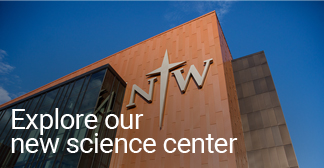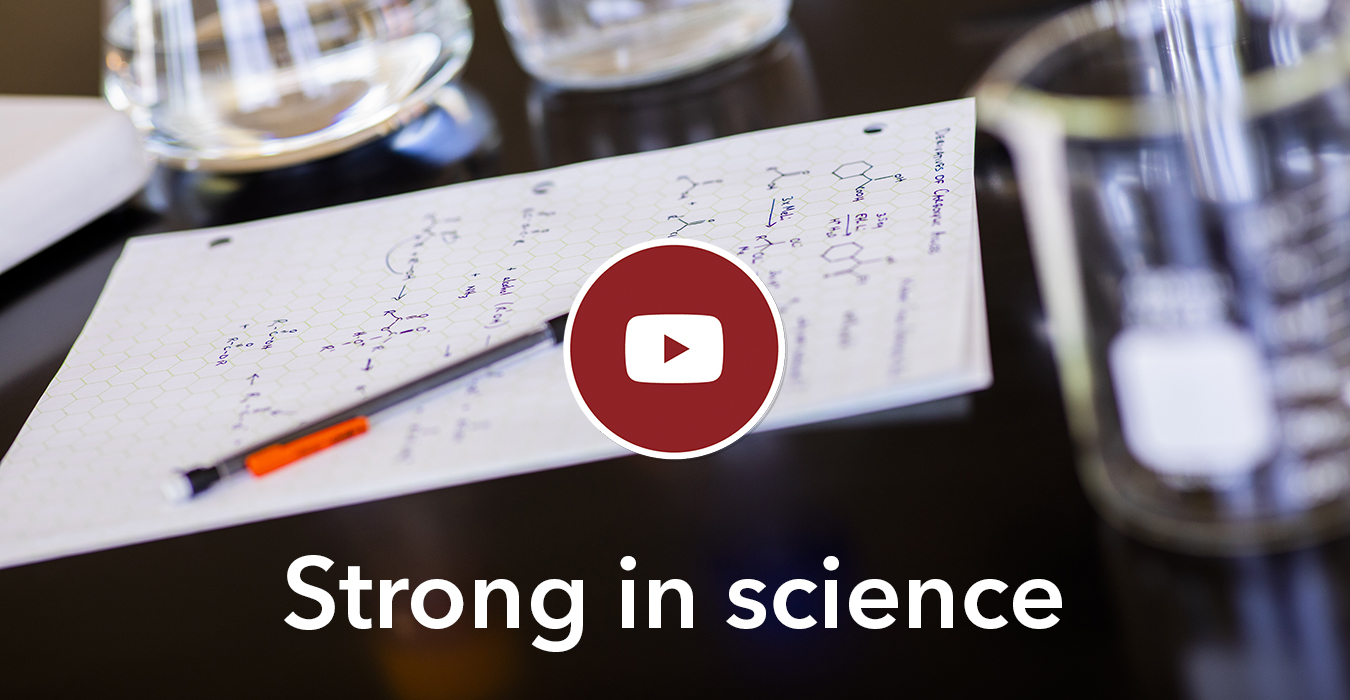The medical laboratory science program is designed to furnish you with a liberal arts education and the skills required to serve as a medical lab scientist. The program is based upon three years of college preparatory work and one year in clinical, professional training at one of several hospital-based programs affiliated with Northwestern College. Upon satisfactory completion of the four years of study, you will receive a Bachelor of Arts degree with a major in medical laboratory science. (You may elect to spend four years at Northwestern before entering the clinical year, a so-called 4+1 program.) At the conclusion of the program, a national registration examination is taken, leading to certification in medical laboratory science. A certificate of completion will be issued by the affiliated hospital-based school.
As a medical laboratory science student, you must fulfill all of Northwestern College’s Bachelor of Arts degree requirements, and a minimum of 96 credits must be earned at Northwestern. Additionally, between 30 and 40 credits are received for the course work completed while enrolled in the hospital-based clinical program. Courses in anatomy, biochemistry, computer science, statistics, physics, communication (speech), management, psychology, parasitology and education are also recommended. A minimum of 96 credits must be earned with a minimum grade point average of 2.80 for admission into the clinical year. The clinical year of professional study at an affiliated hospital includes the following courses:
Northwestern College is affiliated with hospital-based schools of medical laboratory science located at:
Applications to the hospital-based programs are usually made early in the academic year preceding the clinical year. The application deadline is October 1. Specific information regarding each hospital program, including application deadlines and procedures, credit hours awarded by each hospital program, fees, and other information is available from the coordinator on Northwestern’s campus. You must register at Northwestern in order to receive financial aid. An administrative fee is charged for all off-campus programs. Northwestern does not charge tuition for the year of professional training. Costs vary with each hospital-based program. If you're interested in careers in medical laboratory science, consult with the coordinator for this program at the earliest possible time. Program Coordinator:
Major requirements
BIO 115SN - General Biology: Molecular and Cellular Biology
(4 credits) (NWCore option under Science and the Natural World) An introduction to molecular and cellular biology, with an examination of the processes common to living organisms and an introduction to the diversity of life, emphasizing unicellular organisms. This introduction will provide students with a basic understanding of macromolecules, cell structure and function, respiration and photosynthesis, the cell cycle, meiosis, genetics, mechanisms of evolutionary change, and Christian perspectives on evolutionary biology. Prerequisite: Combined Math + Science ACT of at least 44, sophomore standing, or permission of instructor.Note: Three lectures and 3 hours of laboratory work per week. A fee is associated with this course.
BIO 202WI - Genetics and Genomics
(4 credits) (Writing intensive) An introduction to the principles of heredity and their practical applications. Prerequisites: BIO115 or 116. Note: Includes 3 credits of lab per week. A fee is associated with this course.
BIO 203 - Microbiology
(4 credits) A study of the morphology and physiology of microorganisms with special emphasis on bacteria and viruses. Those organisms that have an economic or medical importance will be highlighted, and basic laboratory techniques will be stressed. Prerequisites: BIO115SN or BIO122 and CHE102 or CHE108SN or CHE112.Note: Includes 3 hours of lab per week. A fee is associated with this course.
BIO 222 - Human Physiology
(4 credits) A study of the mechanisms by which the human body functions. Emphasis will be given to nerve and muscle function, and thereafter to hormonal control and the integrated systems that allow for respiratory, digestive, excretory and reproductive activities. Prerequisites: BIO102SN or 115 and CHE101SN, 102 or CHE111, 112 or permission of instructor.Note: Includes 3 hours of lab per week. A fee is associated with this course.
BIO 315WI - Immunology
(4 credits; alternate years, consult department) (Writing intensive)The basis of the immune system throughout the animal kingdom is the ability to recognize "self" from "not-self." This course will investigate the molecular and cellular mechanisms that allow organisms to recognize, control and eliminate such not-self entities as bacterial pathogens, foreign tissue grafts and even transformed cells. Prerequisites: BIO115SN, 116 and CHE101SN, 102 or CHE111, 112. Note: Includes 3 lectures and 3 hours of lab per week.
CHE 315 - Instrumental Analysis
(4 credits; alternate years, consult department) A study of the theory and operation of common laboratory instruments. Topics include: infrared, visible and ultraviolet spectroscopy; atomic absorption and emission spectroscopy; nuclear magnetic resonance spectroscopy; mass spectrometry; gas and liquid chromatography; electrochemical methods. Prerequisite: CHE211 or permission of instructor.Note: Three lectures and one three-hour laboratory period per week. A fee is associated with this course.
CHE 321 - Organic Chemistry
(4 credits) The study of carbon compounds and their functional groups, including nomenclature, synthesis, reactions, structures, mechanisms and spectroscopic analysis. Prerequisites: CHE102 or 112 or permission of instructor.Note: Three lectures and one three-hour laboratory period per week. A fee is associated with this course.
CHE 322 - Organic Chemistry
(4 credits) A continuation of the study of carbon compounds and their functional groups, including nomenclature, synthesis, reactions, structures, mechanisms and spectroscopic analysis.Prerequisite: CHE321.
MAT 208QR - Biostatistics
(4 credits) (NWCore option under Quantitative Reasoning) This course is a study of statistical methodology commonly used in the biological and health sciences. Material includes basic descriptive methods in statistics, foundational concepts in probability, confidence intervals, hypothesis tests involving one or two samples, correlation and regression including multiple regression, contingency tables, and ANOVA. Students will also complete a substantial project. Prerequisite: ACT math score of 20 or above (SAT 510 or above), ALEKS placement exam score of 46 or above, or concurrent enrollment in MAT100.Note: Students may receive credit for only one course among MAT116QR, MAT117QR and MAT208QR.
Choose one course: 4
BIO 326x - Biochemistry:Proteins and Metabolism
(4 credits) A fundamental course surveying biomolecules, catabolism, bioenergetics and biosynthesis. Prerequisites: CHE321 and 322. Cross-Referenced: Cross-referenced in chemistry.Note: Includes 3 hours of lab per week. A fee is associated with this course.
CHE 326x - Biochemistry: Proteins and Metabolism
(4 credits) A fundamental course surveying biomolecules, catabolism, bioenergetics and biosynthesis. Prerequisites: CHE321 and 322. Cross-Referenced: Cross-referenced in biology.Note: Three lectures and one three-hour laboratory period per week. A fee is associated with this course.
Choose one sequence: 8
CHE 101SN - College Chemistry
(4 credits) (NWCore option under Science and the Natural World) This course is an introduction to inorganic chemistry, with an emphasis on the health sciences. It is well suited for students whose programs require one year of chemistry.Note: Three lectures and one three-hour laboratory period per week. Open to all students. A fee is associated with this course.
CHE 102 - College Chemistry
(4 credits) An introductory course in organic and biological chemistry. The content is especially suited to meet the needs of students whose programs require only one year of chemistry. Prerequisite: CHE101SN.Note: Three lectures and one three-hour laboratory period per week. A fee is associated with this course.
CHE 111 - General Chemistry*
(4 credits) An introductory course in chemistry that emphasizes physical and inorganic concepts, problems and calculations. Topics include chemical reactions, stoichiometry, properties of gases, thermochemistry, theories of atomic structure, and chemical bonding. The general chemistry sequence (Chemistry 111 and Chemistry 112) is recommended for students with good math / science preparations who intend to proceed to advanced courses in chemistry, the biological sciences or engineering. Prerequisites: high school chemistry and ACT math score of at least 24 (SAT 570 or above). Note: Three lectures and one three-hour laboratory period per week. A fee is associated with this course.
CHE 112 - General Chemistry
(4 credits) A continuation of Chemistry 111. Topics covered include kinetics, thermodynamics, chemical equilibria, acid-base chemistry and nuclear chemistry. Prerequisite: CHE111 or consent of the instructor.Note: Three lectures and one three-hour laboratory period per week. A fee is associated with this course.
Total credits required: 48


